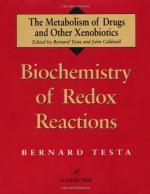|
This section contains 538 words (approx. 2 pages at 300 words per page) |

|
Oxidation-reduction (redox) reactions are chemical reactions in which there is a transfer of one or more electrons between atoms. These reactions often produce energy and are the primary pathway in which molecules such as sugars, fats, and proteins are broken down in the body. One of the early scientists who studied redox reactions was the German chemist, Walther Nerst (1864-1941).
In a redox reaction, electrons are transferred from one reactant to another. Oxidation is the process by which one substance loses electrons. Reduction is the process by which a substance gains electrons. The term reduction refers to the fact that the amount of positive charge on the substance is reduced by the additional electrons. A simple example of a redox reaction is the one which creates sodium chloride (2NaCl) from elemental sodium (Na) and chlorine (Cl2.
|
This section contains 538 words (approx. 2 pages at 300 words per page) |

|


